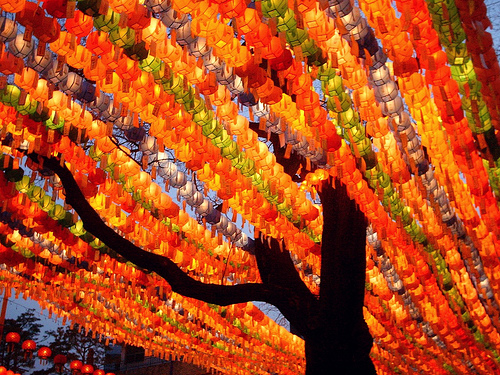
… Or how many lamps in the Buddha’s birthday tree?
Either way, yesterday’s post about Vesak got me wondering: when was the Buddha born? As it turns out, there is a long scholarly discussion on the date of the Buddha’s birth (is anybody surprised?). The traditional date given in most Southeast Asian countries is 624 BCE. Scholars in the West and Asia have long rejected this date and, until recently, have placed the date somewhere between 567-563 BCE. These days, however, and increasing number of scholars place the date of the Buddha’s birth later—some even arguing that it could be up to one hundred years later than previously believed (463 BCE).
Professor Heinz Bechert organized a major symposium addressing this topic at the University of Göttingen in 1988. The three main arguments typically discussed for calculating his birth are:
—The question of dates for Emperor Asoka (especially his coronation date)
—The differences in sources and traditions about the years between the Buddha’s death and Asoka’s coronation
—Various lists of kings and Vinaya masters said to have lived in the years between the Buddha’s death and Asoka’s coronation
Generally, the later dates come from Indian sources and earlier dates come from Sri Lankan Pali texts. All traditions agree that the Buddha lived 80 years.
Personally, I don’t think that it matters to find or agree upon an exact date—but it’s interesting nonetheless. Many of the specific details about the Buddha’s life may or may not have happened at all. The important thing, in my humble opinion, is not the historical truth of these events, but their spiritual truth—their power to inspire. Stories about the Buddha’s life have been meaningfully told and listened to by countless numbers of people for many years. OK, maybe 2,473 years, if you want to get exact about it.
Read more on the historical dating of the Buddha here. (Originally published in the Journal of the Royal Asiatic Society, Series 3, 6.1 (1996): 57-63.)
Thank you for subscribing to Tricycle! As a nonprofit, we depend on readers like you to keep Buddhist teachings and practices widely available.